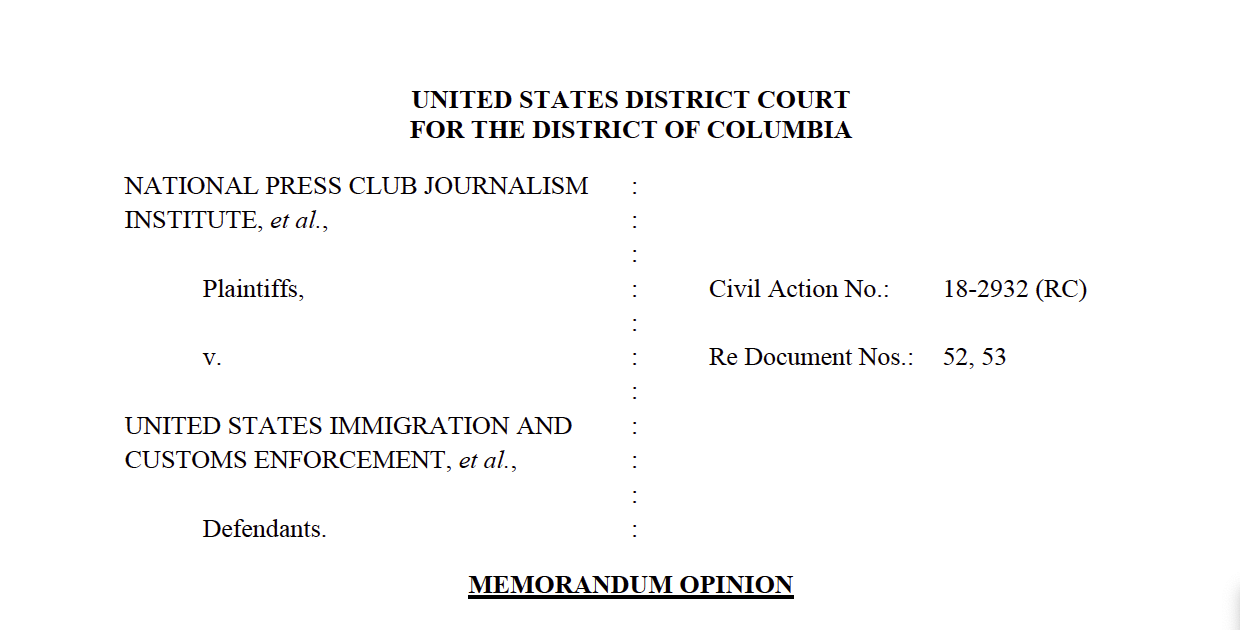Federal judge rejects ICE’s effort to withhold records about Mexican journalist with ‘fatally generic’ justifications

Update: On March 18, 2024, an immigration judge granted asylum to Emilio Gutiérrez Soto and his son, Oscar. The asylum case was successfully resolved after attorneys for the National Press Club Journalism Institute and Kathy Kiely reached an agreement in the Freedom of Information case in which NPCJI and Kiely agreed to drop their challenges to the government’s redactions and withholdings if the government agreed not to oppose asylum for the Gutiérrez Sotos.
The National Press Club Journalism Institute and journalist Kathy Kiely, represented by attorneys from the Reporters Committee for Freedom of the Press and Ballard Spahr, recently secured a key victory in their yearslong legal fight to obtain records related to the detention of a Mexican journalist.
In a ruling issued last month, the U.S. District Court for the District of Columbia concluded that U.S. Immigration and Customs Enforcement failed to adequately search for records NPCJI and Kiely requested under the federal Freedom of Information Act concerning how the agency restricts calls to or from detainees in its facilities in El Paso, Texas. The court also held that the agency did not sufficiently support its extensive withholdings and redactions under various FOIA exemptions.
The ruling requires ICE to turn over one record that the agency improperly withheld. While the court’s decision does not require the immediate disclosure of other requested records, it orders the agency to go a lot further in explaining why certain records should not be made public — and if ICE fails to do so, those records could eventually be released.
The records at issue in the lawsuit concern Mexican journalist Emilio Gutiérrez Soto and his son, who fled Mexico in 2008 after Emilio’s investigative reporting on military corruption led to death threats against him. In 2017, months after the National Press Club honored Gutiérrez Soto with the John Aubuchon Press Freedom Award, an immigration judge rejected their asylum claims. Less than two months later, Gutiérrez Soto and his son were arrested during a routine visit to an ICE facility.
While the U.S. government claimed that they were detained based on a warrant issued after the removal order issued by the immigration judge became final in August 2017, internal ICE emails from February 2017 show that the agency began targeting Gutiérrez Soto well in advance of the decision on his asylum claim.
Kiely, a Missouri School of Journalism professor and former fellow for NPCJI, requested records from ICE in 2018, when Gutiérrez Soto and his son were being held for several months in an El Paso detention facility as they challenged the immigration judge’s decision.
Kiely’s FOIA request was broken into two parts: One part sought emails, memos, and other communications that mentioned Gutiérrez Soto or his son; the other asked for all records mentioning the family’s attorney or law firm that relate to “any mechanisms used to limit or block phone calls from ICE’s El Paso facilities.”
After the government failed to turn over any of the requested records, attorneys from the Reporters Committee and Ballard Spahr sued ICE and the Department of Homeland Security on behalf of NPCJI and Kiely in late 2018, alleging several violations of the federal public records law. The lawsuit prompted ICE to start processing records responsive to Kiely’s request. After three and a half years, ICE and Immigration and Citizenship Services collectively processed roughly 15,000 pages of responsive records, many of which were withheld at least in part or in full.
In its motion for summary judgment, ICE claimed that it was not obligated to search for records about call-blocking mechanisms because that portion of the FOIA request was unduly vague. As to the remaining records, ICE claimed it properly withheld information under exemptions that protect attorney-client privileged communications, personnel and medical files, and law enforcement records. Attorneys from the Reporters Committee and Ballard Spahr countered that the government had failed to conduct reasonable searches and that ICE had improperly withheld certain information.
Judge Rudolph Contreras of the U.S. District Court for the District of Columbia largely found NPCJI’s arguments more convincing. In a 43-page opinion, the judge took issue with ICE’s argument that it had adequately searched for records concerning how the agency limits or blocks calls from its El Paso facilities, concluding that “Plaintiffs’ request was sufficiently clear to trigger ICE’s duty to search for responsive records.”
Contreras also sided with NPCJI on the issue of ICE’s use of FOIA exemptions to withhold certain records. For example, the judge found that ICE could not withhold an email from the office of a former member of Congress under an exemption that protects inter-agency or intra-agency communications because the record wasn’t sent from a government agency. Contreras also wrote that ICE had failed to establish that certain records it withheld were compiled for a law enforcement purpose, describing the agency’s explanation as “fatally generic.”
Reporters Committee Senior Staff Attorney Adam Marshall, one of the RCFP attorneys who represents NPCJI and Kiely in the case, said the court’s decision is a “powerful reminder that transparency is the rule, not the exception. The government bears the burden to justify secrecy when it comes to documents about Mr. Gutiérrez, and it failed to do so here.”
The court’s ruling comes just a few months after a three-judge panel of the Board of Immigration Appeals concluded that an El Paso immigration judge’s two decisions against Gutiérrez Soto’s asylum claim were “clearly erroneous.” A hearing in Gutiérrez Soto’s case is scheduled for March 18.